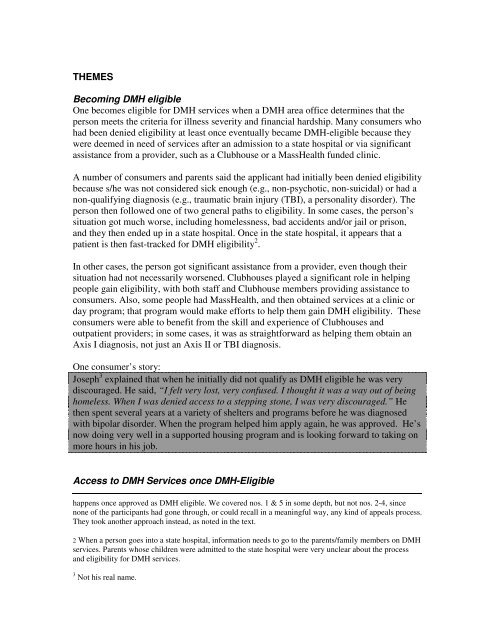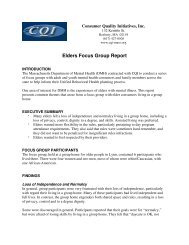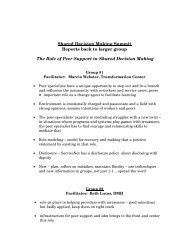Eligibility/Access Focus Group Report - Consumer Quality Initiatives
Eligibility/Access Focus Group Report - Consumer Quality Initiatives
Eligibility/Access Focus Group Report - Consumer Quality Initiatives
- No tags were found...
Create successful ePaper yourself
Turn your PDF publications into a flip-book with our unique Google optimized e-Paper software.
THEMESBecoming DMH eligibleOne becomes eligible for DMH services when a DMH area office determines that theperson meets the criteria for illness severity and financial hardship. Many consumers whohad been denied eligibility at least once eventually became DMH-eligible because theywere deemed in need of services after an admission to a state hospital or via significantassistance from a provider, such as a Clubhouse or a MassHealth funded clinic.A number of consumers and parents said the applicant had initially been denied eligibilitybecause s/he was not considered sick enough (e.g., non-psychotic, non-suicidal) or had anon-qualifying diagnosis (e.g., traumatic brain injury (TBI), a personality disorder). Theperson then followed one of two general paths to eligibility. In some cases, the person’ssituation got much worse, including homelessness, bad accidents and/or jail or prison,and they then ended up in a state hospital. Once in the state hospital, it appears that apatient is then fast-tracked for DMH eligibility 2 .In other cases, the person got significant assistance from a provider, even though theirsituation had not necessarily worsened. Clubhouses played a significant role in helpingpeople gain eligibility, with both staff and Clubhouse members providing assistance toconsumers. Also, some people had MassHealth, and then obtained services at a clinic orday program; that program would make efforts to help them gain DMH eligibility. Theseconsumers were able to benefit from the skill and experience of Clubhouses andoutpatient providers; in some cases, it was as straightforward as helping them obtain anAxis I diagnosis, not just an Axis II or TBI diagnosis.One consumer’s story:Joseph 3 explained that when he initially did not qualify as DMH eligible he was verydiscouraged. He said, “I felt very lost, very confused. I thought it was a way out of beinghomeless. When I was denied access to a stepping stone, I was very discouraged.” Hethen spent several years at a variety of shelters and programs before he was diagnosedwith bipolar disorder. When the program helped him apply again, he was approved. He’snow doing very well in a supported housing program and is looking forward to taking onmore hours in his job.<strong>Access</strong> to DMH Services once DMH-Eligiblehappens once approved as DMH eligible. We covered nos. 1 & 5 in some depth, but not nos. 2-4, sincenone of the participants had gone through, or could recall in a meaningful way, any kind of appeals process.They took another approach instead, as noted in the text.2 When a person goes into a state hospital, information needs to go to the parents/family members on DMHservices. Parents whose children were admitted to the state hospital were very unclear about the processand eligibility for DMH services.3 Not his real name.




